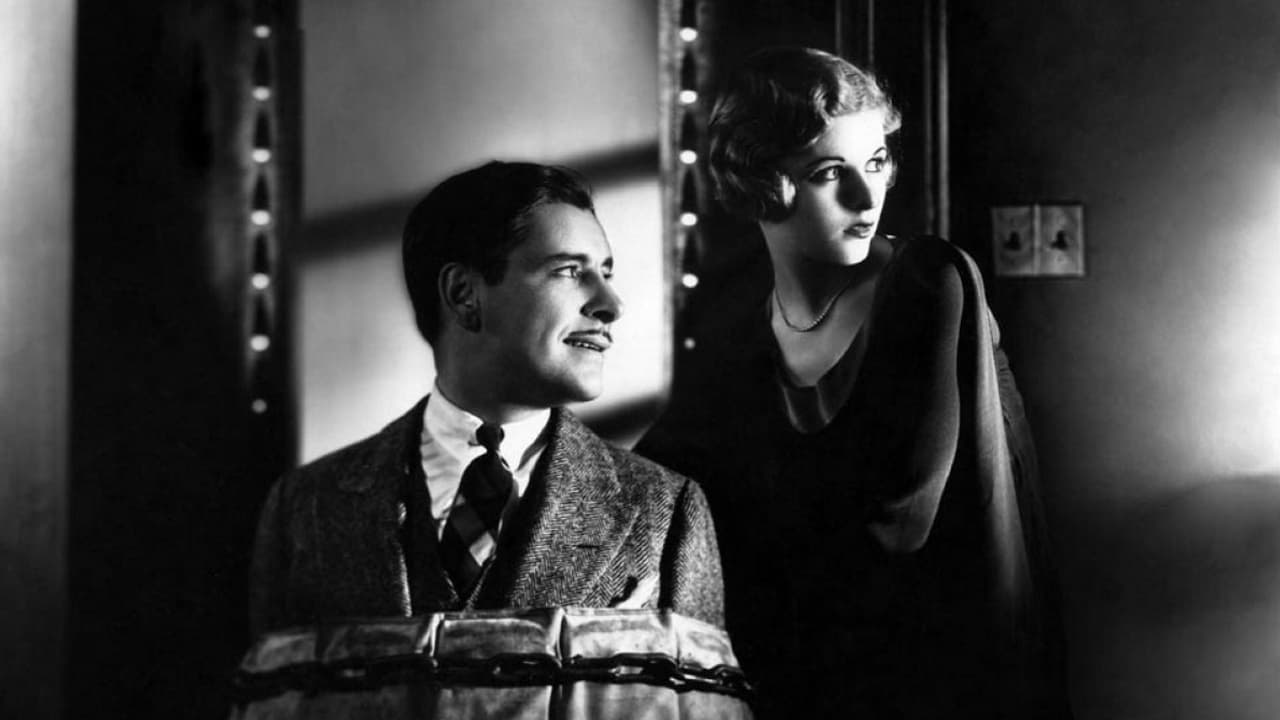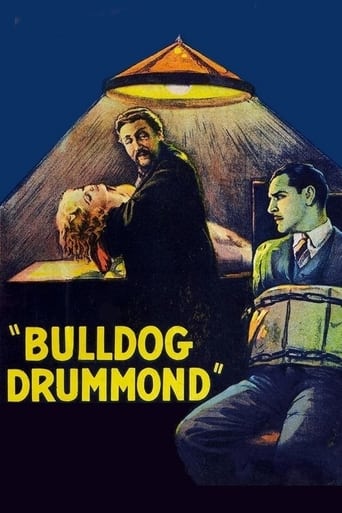

Good start, but then it gets ruined
... View MoreGood films always raise compelling questions, whether the format is fiction or documentary fact.
... View MoreUnshakable, witty and deeply felt, the film will be paying emotional dividends for a long, long time.
... View MoreA film of deceptively outspoken contemporary relevance, this is cinema at its most alert, alarming and alive.
... View MoreIf Ronald Coleman was nervous about his transition from silent to talkies, he needn't have worried. He had a cultured, rich and elegant speaking voice which made the transition effortless.For his first talkie, he was cast in the lead role in "Bulldog Drummond". The fun loving adventurer was tailor made for Coleman. His cavalier, bon vivant, devil may care Drummond was a treat to behold. The problem I had with the film was it's "B" movie script.Capt. Hugh Drummond (Coleman) is a rich retired WW1 army officer bored to death with civilian life. He decides to place a personal ad in the London Times advertising his services. Among the replies is one from a young lady named Phyllis (Joan Bennett). It seems her uncle is being held captive in a "Nursing Home" by a gang of extortionists.The nursing home is run by a Dr. Lakington (Lawrence Grant), the mad doctor of the piece and his two cohorts, Pterson (Montagu Love and his friend Irma, played seductively by Lilyan Tashman. The gang is out to force Phyllis' uncle to sign over his considerable wealth to them.Drummond along with his friend Algy (Claude Allister) and valet Danny (Wilson Benge) attempt to foil the gang's plans. Danny takes an interest in Irma, while Drummond per sues the young Phyllis. But Drummond is captured by the gang and................................Coleman as previously stated, breezes along seemingly enjoying his role. Although he is best remembered for his more serious roles (A Tale of Two Cities, Lost Horizon etc.), he was also quite adept at light comedy as was the case in this mystery/comedy. He also got to romance the still teen-aged Joan Bennett as well.Of the rest of the cast, Tashman stands out as "My Friend Irma" and veteran silent baddie Love as her "partner". Allister as the silly ass Algy is way over the top. Grant as the mad doctor invokes memories of the mad doctors of the "B" horror flicks of the 40s with J. Carroll Naish coming to mind.There is an unusual ending to the story that to me, didn't make much sense however, I'll let you decide on that.Followed by "Bulldog Drummond Strikes Back" (1934) also with Coleman and a "B" series in the late 30s with John Howard as Drummond. MGM tried to revive the character in "Calling Bulldog Drummond" (1951) with Walter Pidgeon as Drummond , to no avail.
... View MoreThis 1929 adaptation of the famous Sapper hero is one of the earliest screen incarnations of the character, only the third to be made as far as I can tell. The film was produced by big shot Samuel Goldwyn in America, although by all respects and purposes it looks and feels like a British movie and it was shot in London. It stars popular actor Ronald Colman in the leading role and he's a good fit for Drummond; he looks the part physically and he has a kind of macho charisma to boot.The film's plot is quite simplistic but we must remember that this was made right at the outset of the talkies when cinema was still in its early days. Drummond advertises for adventure and is contacted by a beautiful young woman who claims that her uncle is being held hostage by a crooked gang. With the help of his buddy Algy and his butler Danny, Drummond heads off to investigate.Most of the action is centred around a creepy old mansion with plenty of sinister characters making up the cast. Ther's a surprising hint at rape along with set design and atmosphere familiar from the era's horror pictures. The story could have used a little more physical action but we do get a car chase. Some parts of the story are a little dissatisfying, particularly the ending, but overall it holds up very well and certainly doesn't feel its age. I particularly enjoyed Claud Allister's humorous performance as comic relief character Algy.
... View MoreThis started off yet another series devoted to the exploits of a literary detective figure (though he is actually an ex-British military officer); even if the films themselves never reached particular heights and, following the first two entries starring Ronald Colman (both, incidentally, included in the "Wonders In The Dark" poll), fell definitely into the B-movie league, this initial outing did yield two Oscar nominations for Best Actor and Best Art Direction (William Cameron Menzies)!Despite being 85 years old and thus understandably stagey in treatment, the film survives quite nicely as pure entertainment (save for the frequent singing by a young man at an inn, summarily booted out when the villains turn up!), and can even be seen to have left its mark on culture (the presence of both a mad doctor and a femme fatale among its cast of characters). It is only the attitudes that have dated: Drummond's constant cheerfulness and over-confidence (we never really feel he is in danger throughout, also because there is a chivalric sense of mutual respect between hero and antagonist – though he does dispose violently and gratuitously of the slow-talking scientist, albeit offscreen); the latter, then, is an archaic gangster type; Drummond is assisted by silly ass Claud Allister's Algy (who, annoyingly, repeatedly asks for the afore-mentioned vamp's telephone number as if it were the most natural thing to do under the circumstances, or that she would ever even deign to give him the time of day!) and a butler; Drummond's romantic attachment to the heroine is likewise merely an obligatory convention (though 38 at the time, Colman always seemed to look middle- aged – which makes him that more unsuited to blonde Joan Bennett, not yet out of her teens and still a decade away from her 1940s heyday!). Curiously enough, though this tale is depicted as being Drummond's baptism of fire in the sleuthing business, the villainess already calls him by his "Bulldog" nickname! Being a Samuel Goldwyn production, the film is slickly-handled (Gregg Toland was one of the cinematographers) and, as I said, includes a number of welcome elements that would eventually find their utmost expression in other popular genres (horror, noir and espionage thrillers – the latter in the deployment of a criminal organization, even if their objective here involves nothing more earth-shattering than the simple extortion of money!).
... View MoreThe year 1929 was a pivotal year in Hollywood for the talkie with a great rise in the percentage of all talking pictures and a slowdown on silents. Ronald Coleman, a box office star in silent pictures, makes his talking debut. Audiences of the day were pleased with his wonderfully cultured English. Also giving great support is Claude Allister as his wealthy society friend Algy. Joan Bennett in her film debut at age 18 shows her inexperience, though her lines are not much to work with, and Lawrence Grant as the evil Dr. Lackington hams it up like John Barrymore and delivers his lines at the slow and deliberate pace of Bela Lugosi.Captain Hugh "Bulldog" Drummond is a wealthy retired office of the British army who yearns for another war to fight. Like Bruce Wayne (Batman), he wants to use his skills to help those in need. He answers the call to meet Joan Bennett at the Green Bay Inn and finds out that her father is being held against his will and tortured at a nursing home run by the evil Dr. Lackington (Grant). Montague Love is Dr. Lackington's strong man. In one very funny scene Love goes to the Green Bay Inn to catch Drummond. An Irish tenor has been singing and playing his accordion all evening. Love and a crony toss him out the door with his accordion making glissandos as it exits with him.Drummond has a stable of cars of which two are shown in the film. The one he chooses to drive is a Mercedes SSK (the Excalibur is a copy of it). He drives it at night with the top down wearing a hat, scarf, and trench coat. Algy and his valet are always nearby following him in his Rolls Royce! This movie might seem crude by today's standards, but judging it in the context of its time, it is far more entertaining than the poor musicals or slow boring adaptations of plays that the talkies usually featured during this era. Compare it with "The Great Gabbo" also released that year or "Annie Christie" , Garbo's first talkie released in 1930, and you'll see what I mean. In my opinion it's the best talkie prior to "All Quiet on the Western Front", which was filmed in 1929 and released the following year and went on to win "Best Picture".
... View More